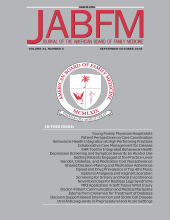To the Editor: The article by Drs. Edwards and Norris1 in the September-October 2004 issue concluded that family physicians can provide safe and competent colonoscopy in a rural setting. Colonoscopy is increasingly being used as one of the screening options for colorectal cancer by many gastroenterologists. However, the number of gastroenterologists and other qualified endoscopists is not sufficient to meet the growing demand, especially in rural communities where there is an even greater shortage of specialists. Even though the sample size in the article is smaller than in the referenced studies, the results seemed to be comparably favorable. Even though the four endoscopists had different experience levels, with the number of endoscopies done before the study ranging from less than 50 to more than 500, the success rate for reaching the cecum was more than 90%. The authors concluded that “well-trained family physicians can safely provide diagnostic and therapeutic colonoscopy for their patients.” Are the authors implying that family physicians who have done less than 50 colonoscopies during their training are well-trained and competent to do the procedure? The Gastroenterology Leadership Council2 and the Accreditation Council for Graduate Medical Education3 both recommend at least 100 colonoscopies with 20 polypectomies to achieve competency in performing colonoscopy. How can this training be incorporated into the 3-year family practice residency?
The shortage of well-trained colonoscopists may be reduced in the future by developments in new techniques of visualizing the bowel such as wireless capsule endoscopy4 and computed tomographic colonography.5 These emerging technologies may eventually reduce the number of colonoscopic procedures in the future, leaving the few gastroenterologists available to perform colonoscopies only on those patients who either have a positive result or who are not good candidates for wireless capsule endoscopy or computed tomographic colonography.







